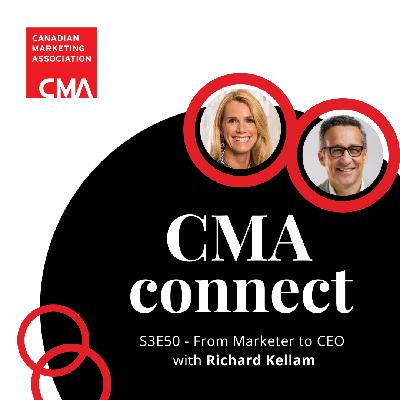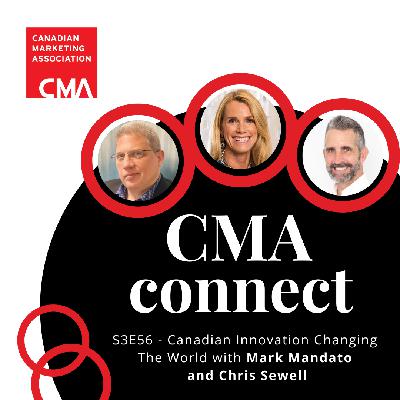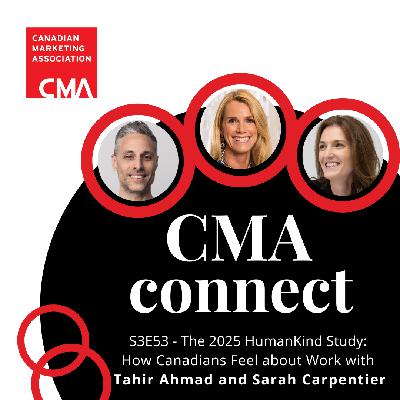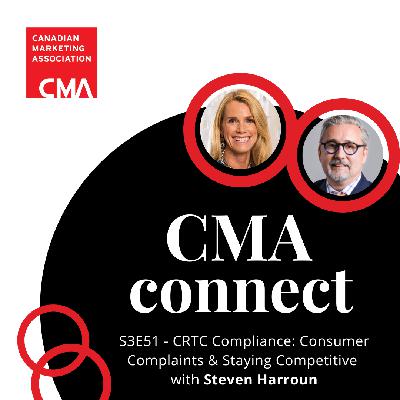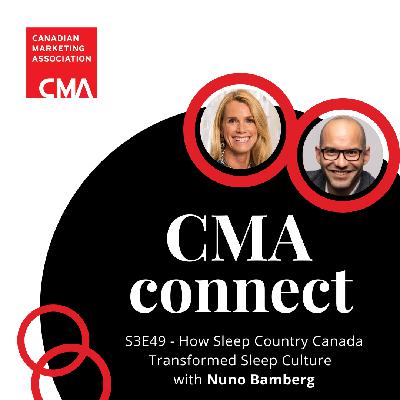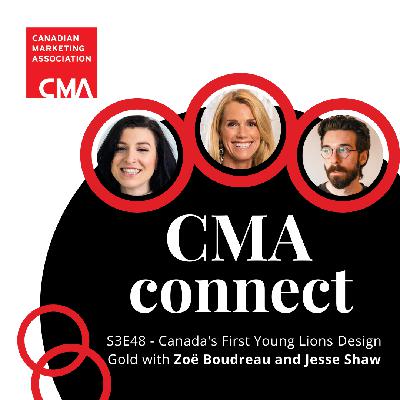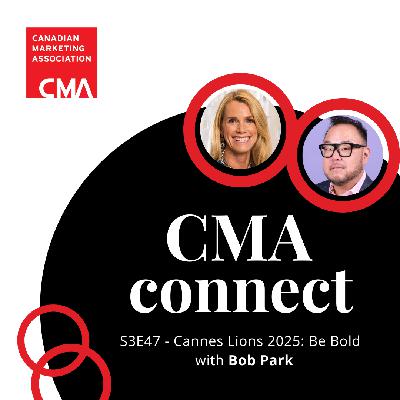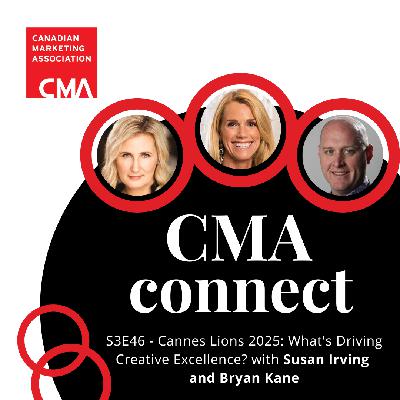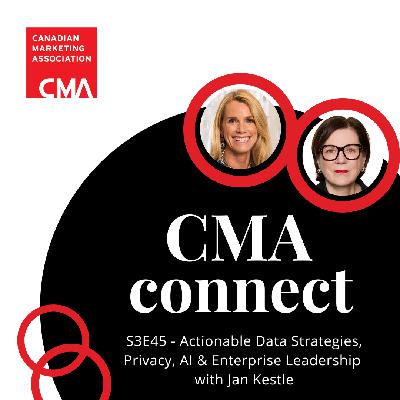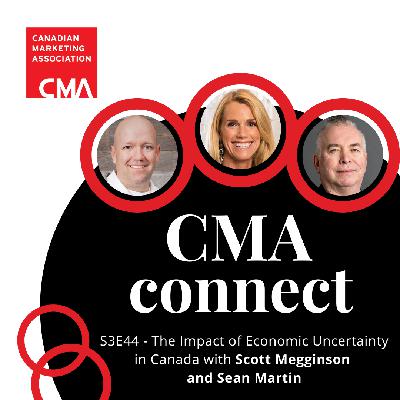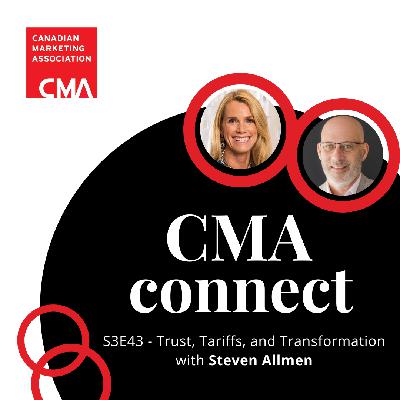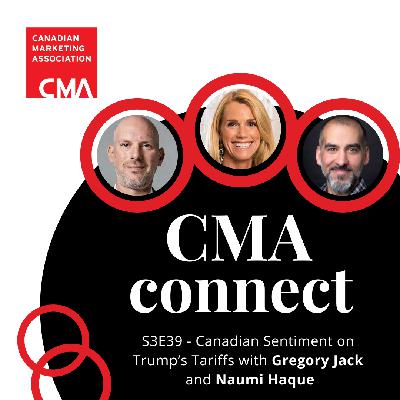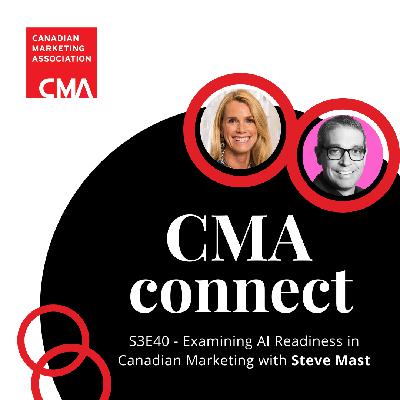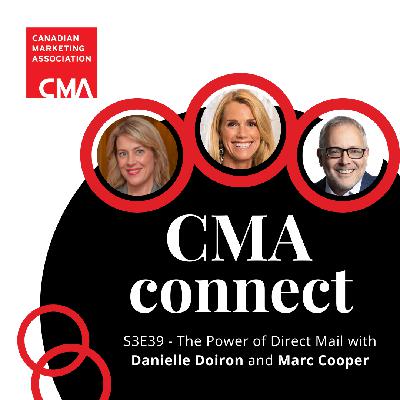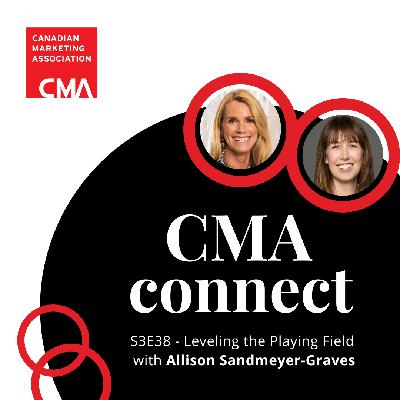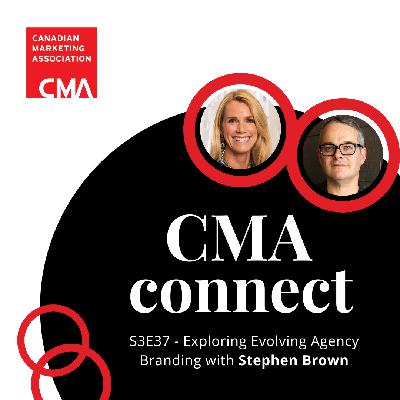EP50 - From Marketer to CEO with Richard Kellam
Description
What does it take to rise from your first marketing role to CEO of a major communications company? In today's episode, Alison Simpson, CEO of the CMA, sits down with Richard Kellam, who transformed his career from marketer to President & CEO of DATA Communications Management Corp. (DCM). Richard reveals how he leveraged transferable skills to make the jump to CPG, secured international opportunities, and how he evolved from Chief Customer Officer to CEO.
00:00:01 :18 - 00:00:28 :10
Presenter
Welcome to CMA Connect, Canada's marketing podcast, where industry experts discuss how marketers must manage the tectonic shifts that will change how brands and businesses are built for tomorrow, while also delivering on today's business needs. With your host, CMA CEO Alison Simpson.
00:00:28 :12 - 00:01:00 :08
Alison
In today's episode, it's my pleasure to welcome Richard Kellam, who represents one of marketing's most desirable success stories. A CMO who successfully transitioned to global and national president and CEO roles. This is still far too much of a rarity in our profession. Richard is president and CEO of Data Communications Management Corp., commonly known as DCM. His journey from brand manager to chief executive spans three decades, eight different countries and leading marketing, sales and ultimately the top job for tier one brands.
00:01:00 :10 - 00:01:26 :12
Alison
Richard's career progression through marketing leadership roles at Molson, Wrigley, Mars and Goodyear, combined with strategic moves into sales and general management positions, provides a really wonderful blueprint for ambitious marketing professionals seeking to expand their influence beyond the marketing role. At DCM, Richard is proving that marketing-trained CEOs bring truly unique advantages to leadership roles, particularly in today's customer-centric, digitally driven business environment.
00:01:26 :14 - 00:02:00 :05
Alison
He's leading DCM's transformation from a traditional print company to a tech enabled marketing solutions provider, demonstrating how his marketing background provides crucial insights into customer needs as well as market trends and brand positioning. His career offers inspiration and practical guidance for many talented CMOs who aspire to CEO roles, but often find the path unclear. Richard's proved that with the right experiences, mindset shifts and strategic career moves, the transition from CMO to CEO is not only possible, but can be a very natural evolution for marketing leaders.
00:02:00 :07 - 00:02:03 :13
Alison
Richard, it's an absolute pleasure to welcome you today.
00:02:03 :15 - 00:02:05 :15
Richard
Thanks for having me, Alison. Appreciate it.
00:02:05 :17 - 00:02:18 :15
Alison
And Richard and I first met very early in our careers. He was at Molson and I was the VP at McLaren. McCann overseeing the Molson account. So it's been a long journey together. And Richard, it's been really amazing to watch your path.
00:02:18 :17 - 00:02:21 :10
Richard
Thank you. Appreciate it. Yeah, it was a lot of fun working together many years ago.
00:02:21 :12 - 00:02:30 :16
Alison
So I'd love you to take us to your first job in marketing and how you thought about your career. In those early days, did you ever consider the possibility of becoming a CEO?
00:02:30 :18 - 00:02:54 :23
Richard
I'm not sure I even knew what CEO meant back then. So I guess the answer to your question is no. I never really thought it was, it was possible. My actually first job at university was in sales for a company called Playtex. Actually, I applied for the job, but I"m really gonna date myself here. But it was in a classified ad in the Globe and Mail, right?
00:02:55 :02 - 00:03:13 :18
Richard
Who remembers that? And I applied for the job, went in and interviewed for it and successfully got the role. They actually had two divisions. They had a they called it a family products mission. They had an intimate apparel division, and I was hired for the intimate apparel division. So I'm sure people know the Playtex products in that division and started in sales. Had a combination of, key accounts.
00:03:13 :18 - 00:03:33 :16
Richard
A lot of the accounts aren't even in the market anymore. Simpson's, Eaton's, Sears. Of course, none of those are around. Kmart, Woolworths, which Walmart acquired. And then I had a bunch of independent accounts in downtown Toronto as well. So I did that for the for the first year and thankfully ended up being quite successful. I actually won rookie of the year, which is quite fun.
00:03:33 :16 - 00:03:43 :16
Richard
And then after one year I was moved into marketing and I was an assistant brand manager on a few brands in Playtex. So that was my start in my marketing journey, you know, quite a while ago in the mid 80s.
00:03:43 :18 - 00:04:05 :01
Alison
I definitely remember the days of classified ads and all of the retailers you mentioned. So we're certainly of the same vintage. I also worked in sales earlier in my career, and I think it's such a powerful view to have, especially early in your career, and can really shape your approach to marketing. So building on that, what experience or skills did you gain in that first sales and marketing role that have served you well throughout your career?
00:04:05 :03 - 00:04:31 :12
Richard
So the biggest skill I gained on the marketing side was the importance of data analytics in business intelligence, on the sales side as well. And this was a days where computers were just being introduced to business and nobody had their own personal computer. Back to my point where I won this, this rookie of the year sales award. Actually, I got a trip to Jamaica, so my wife and I went to Jamaica, and on that trip I read a book on how to use Excel.
00:04:31 :14 - 00:04:44 :23
Richard
So I learned Excel from a from a book because I didn't have a computer. So I was sitting on a beach for the week, just reading about how to use Excel. And when I got back to the office, they had a computer room. So you didn't have a computer at your desk. You had a computer room. And I started to apply that
00:04:44 :23 - 00:05:05 :08
Richard
learning to learn how to use Excel, because I knew that data analytics and business intelligence was extremely important in marketing or important in business. So I, I've been kind of a numbers guy or a data guy or an analyst guy or business intelligence guy, kind of for my whole career, using data and insights to create value for a business.
00:05:05 :08 - 00:05:27 :10
Richard
So that was really defining, I'd say, point for me in my career, and it's certainly been kind of central to my skill and capability as I've progressed. And I'd say the other key competency or attribute, I'm, my archetype is an explorer. So I like to learn new things and see new things and discover new things. So I'm a very curious business leader as well.
00:05:27 :10 - 00:05:39 :14
Richard
So curiosity, while I was in that sales role or in that early stage entry level marketing role, was an important competency and that really contributed to my success as well. In addition to the data analytics and business intelligence.
00:05:39 :16 - 00:06:00 :19
Alison
Curiosity and the constantly learning is such a mission critical skill and mindset for anyone in marketing. I think it's always been the case, but given how the pace of change is accelerated around us, it is absolute mission critical. So following Playtex, you moved into the first of many marketing roles in the CPG industry, starting with Robin Hood Foods and then later Wrigley.
00:06:00 :21 - 00:06:03 :11
Alison
What made that move possible for you?
00:06:03 :13 - 00:06:23 :07
Richard
I actually worked for a guy who came out of, Procter and Gamble. So that was my first boss at Playtex, and he talked a lot about, you know, kind of the CPG space and the learning and the development and the skill and capability that they build. And so I thought, you know, I had this opportunity come by for Robin Hood Multifoods was a recruiter, headhunter that was calling me and talk to me about this role.
00:06:23 :07 - 00:06:41 :22
Richard
So that was kind of an interesting role and, and a good opportunity for me to kind of expand my horizon into a new category. Interesting thing about Robin Hood, again, that was kind of my entry into CPG. But if you think about it, I was the brand manager on Robin Hood Flour. So you can't get a more commoditized business, right?
00:06:41 :22 - 00:07:02 :12
Richard
Salt, sugar, flour those are all commodities. So to really understand the category and how to create value in a highly commoditized category was huge learning for me. And, and it was a lot of fun, actually, at the same time. And we had a really good run on Robin Hood Flour. The brand had a great success and proven that marketing does, you know, deliver value, especially in a highly commoditized category like that.
00:07:02 :12 - 00:07:07 :11
Richard
Right. Brand is everything. So learned a lot there. And then obviously applied that learning as I progressed.
00:07:07 :13 - 00:07:14 :09
Alison
And you went on to spend the bulk of your career in CPG. So what were the keys to your advancement and success?
00:07:14 :11 - 00:07:35 :11
Richard
Yeah. Coming back to what I said earlier, you know, my curiosity, my explorer archetype, really kind of wanted to understand and discover new opportunities to build value in a business or value

